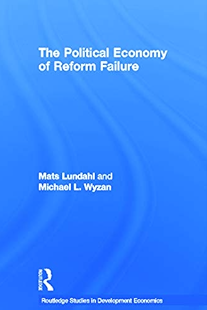The Political Economy of Reform Failure - Mats Lundahl & Michael L. Wyzan (Eds.)

Editor(s): Mats Lundahl & Michael L. Wyzan
Publisher: Routledge
Year of Publication: 2005
Print Length: 344 pages
Genre: Non-Fiction / Economics, Finance, Politics & Political Science, Social Science, Policy & Practice, Social Justice
Topic: Accountability, Capitalism, Civil Participation, Community, Crisis / Crises, Economy, Finance, Globalization, Governance
Economists have moved in recent years beyond analyzing the manner in which the macroeconomies of different countries function and prescribing appropriate policies for dealing with domestic and external imbalances. Increasingly, they have sought to understand the complex interaction between political and economic phenomena. This book considers issues of economic reform in a broad range of settings:
* developed countries
* transition countries
* developing countries
Using country specific cases such as Uzbekistan, Burma and Haiti, it focuses on those territories which have encountered problems reforming, allowing the reader to gain an accurate understanding of the factors that inhibit the success of economic reform, the different context in which economic reform is attempted, and the different challenges that individual countries face.
An international team of contributors including Bo Södersten, Deepak Lal and Ron Findlay have been brought together to analyze these topical issues, making this an informative and thought-provoking book, of interest to those involved in the field of development studies.
Table of Contents
Notes on Contributors
Aknowledgements
1. Introductions by Mats Lundahl and Michael L. Wyzan
PART I: Developed countries
2. Stable growth with slow and expensive adjustments: an essay on the old OECD countries using Denmark as an example by Martin Paldam
3. Reform failure and poor economic performance: the case of Sweden by Bo Sedersten
4. The role of European integration in the reform process: the Freek experience by Sarantis E.G. Lolos
5. The political economy of reform failure and macroeconomic mis-management: Turkey, 1980-2002 by A. Ering Yeldan and Sabit Khakimzhanov
PART II: Transition countries
6. On the political economy of transformation: reasons for success, causes of failure by Jozef M. Van Brabant
7. A chequered history: political culture and conflict in Albanian economic reform by Marta Mugo and Orjan Sjoberg
8. Bulgaria: macroeconomic and political-economic implications of stabilisation under a currency board arrangement by Georgy Y. Ganev and Michael L. Wyzan
9. The political-economy trap and economic reform in Russia by Barry W. Ickes
10. Uzbekistan: economic reform and economic performance, 1991-9 by Richard Pomfret
PART III: Developing countries
11. Political economy of economic policy making in developing countries: an overview by Deepak Lal
12. Burma: the pathology of economic decline and political repression by Ronald Findlay
13. Haiti: nothing but crisis by Mats Lundahl and Ruben Silie
14. From restoring external solvency to managing the social deficit: Nicaraguan debt revisited by Jaime Behar
15. The political economy of policy failure in Zambia by Arne Bigsten and Steve Kayizzi-Mugerwa
Index

Mats Lundahl is a Swedish economist, and a tenured professor at the Stockholm School of Economics. His specialties are foreign aid and development economics.
Source: https: https://www.hhs.se/en/persons/l/lundahl-mats/
More from Mats Lundahl in this library, click here.
Michael L. Wyzan is Research Fellow, Stockholm Institute of East European Economics and Associate Professor, Stockholm School of Economics.
Source: https://www.bloomsbury.com/uk/author/michael-l-wyzan/
More from Michael L. Wyzan in this library, click here.
